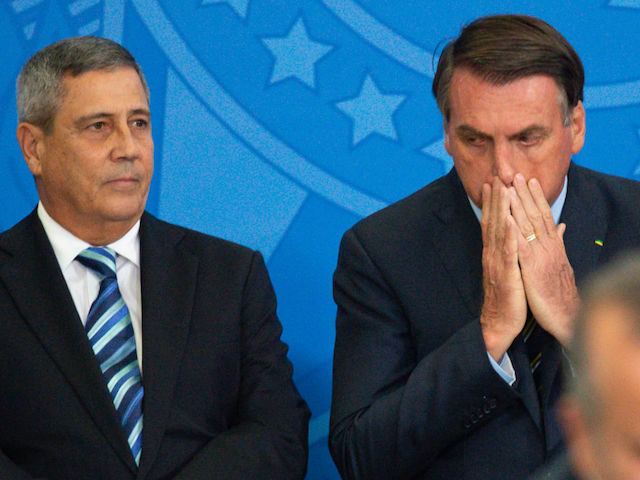The heads of Brazil’s Army, Navy, and Air Force all resigned simultaneously on Tuesday in what multiple Brazilian outlets described as a “turbulent” meeting with Defense Minister Walter Braga Netto, who assumed the position on the same day.
Conservative President Jair Bolsonaro accepted the resignation of Braga Netto’s predecessor, Fernando Azevedo e Silva, on Monday. The three military leaders allegedly opposed his replacement. Azevedo’s departure followed the controversial resignation of Foreign Minister Ernesto Araújo on Monday after the top diplomat accused members of Congress of pressuring him to support the introduction of Chinese telecommunications company Huawei into Brazil’s market. Araújo’s supporters accused the Chinese government of pressuring Bolsonaro to replace Araújo with a more malleable diplomat in the eyes of the Communist Party.
Health Minister Eduardo Pazuello, Attorney General Andre Levi, and several other cabinet members also recently departed their posts. Braga Netto served as Bolsonaro’s chief of staff before assuming the defense ministry post.
The government offered few official statements on the military shake-up and pro-Bolsonaro media noted that replacing military branch leaders often does coincide with a change in the Defense Ministry. Sources within the government speaking to the conservative Brazilian outlet Terça Livre insisted it would have been stranger for one of the three branches to lose its leader without the other witnessing similar reform. Terça nonetheless noted the head of the Army, Edson Leal Pujol, had faced “friction” with the Bolsonaro government, making him a likely candidate for replacement. In Brazil, the nation’s president is also the commander-in-chief of the armed forces.
Mainstream outlets depicted the departures as chaos, however, hinting at major rifts between Bolsonaro and Brazil’s top brass, despite Bolsonaro’s background as a military captain. The Brazilian newspaper O Globo, also citing anonymous sources, reported on Wednesday that military leaders had “set aside their passive stance, which allowed the president to give the impression he had the support of the troops for his speeches” and had thus enacted this mass resignation to give the appearance Bolsonaro was isolated in the presidential palace. The newspaper claimed Azevedo’s removal as defense minister occurred shortly after Bolsonaro urged him to replace Pujol.
This, other outlets like the far-left Folha de Sao Paulo noted, prompted Pujol’s colleagues at the other military branches to resign alongside him in a combative meeting with Braga Netto. The newspaper also reported the Bolsonaro government downplayed anonymous reports of a tense meeting and insisted no significant changes would occur at the military, including any changes that would empower the military politically.
Reports that anti-Bolsonaro leaders in the military decided not to remain “passive” come at a sensitive time for Brazil. The nation marks the anniversary of the 1964 military overthrow of the left-wing government on Wednesday. The military leadership during the junta government was largely pro-American and acted with force against communists in the country. Leftists denounce the coup as a violation of democratic principles and accuse the military of sweeping human rights abuses.
Bolsonaro has not made any significant public remark on the anniversary this year at press time, instead, using his social media accounts to focus on news about the Chinese coronavirus pandemic. His son, Sao Paulo lawmaker Eduardo Bolsonaro, posted an homage to the military describing the coup as legal and necessary.
“On March 31, 1964, the Armed Forces acted WITHIN THE LAW, with massive and previously existing POPULAR SUPPORT, guaranteeing a FREE BRAZIL,” he wrote on Twitter. “Given the story told by the same bandits on the left, let us always remember: those who defended DEMOCRACY were not them, but the brave members of the Armed Forces.”
The alleged tensions between Bolsonaro and the military appear to be separate from the circumstances surrounding former top diplomat Ernesto Araújo’s departure on Monday. Unlike the military leaders, Araújo published a lengthy letter explaining “adversarial” forces, without naming them, had made his job “impossible.”
“The truth liberates and lies enslave,” Araújo’s letter read. “Today, lies are shamelessly used for a materialistic project that seeks to enslave Brazil and Brazilians, and enslave the human being himself and rob him of his material and, primarily, spiritual dignity.”
Araújo had accused the head of the Senate Foreign Relations Committee the day before of pressuring him to encourage the Bolsonaro government to “make a move on 5G,” apparently meaning to support the Chinese company Huawei in its quest to land the lucrative contract to build Brazil’s 5G network. Huawei has close ties to the People’s Liberation Army (PLA) and is considered by many nations, including the United States, to represent a national security threat. The accused senator confirmed she discussed Huawei with Araújo but disparaged him as an “outcast” for his firm stance against Chinese colonialism in the country.
Brazilian media described the Chinese Communist Party as having visible “discomfort” with Araújo for his refusal to facilitate greater Chinese influence in the country in the aftermath of his dismissal.

COMMENTS
Please let us know if you're having issues with commenting.